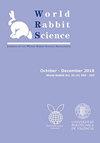影响法国养兔户采用亲福利创新的因素
IF 1.3
4区 农林科学
Q3 AGRICULTURE, DAIRY & ANIMAL SCIENCE
引用次数: 1
摘要
消费者越来越有动物福利意识,并对室内笼养系统(如养兔所使用的笼养系统)持批评态度,欧洲已承诺立法禁止笼养动物。研究证明了畜牧部门制度变革或锁定的若干技术和经济驱动因素。在这里,我们研究的决定因素,动机和/或阻力采用亲福利的做法在法国养兔户。首先,我们对兔农进行了31次探索性访谈,并对访谈记录进行了专题分析。然后,我们评估了法国养兔户对变化的接受程度,使用了包含83个变量的问卷,包括对变化的接受程度、农场的技术经济特征、职业状况以及养兔户的个人和职业生活。对变化的接受程度是通过两个综合变量来评估的,这两个变量总结了支持变化的实践(农场对住房、管理、喂养等已经做出的改变)和对创新的兴趣(对新奇事物的接受程度和与创新的关系),分为3分(低、中、高)。我们使用卡方检验和Cramer 's v分析了技术经济和社会人口变量(社会属性、内部和外部动机)对创新和支持变革实践的兴趣的影响。我们收集了78份完整的问卷,即覆盖了法国10%的专业养兔人。结果显示,对创新的兴趣与支持变革的实践之间存在联系(P<0.001)。社会人口变量(33%,21/63;P<0.05),而不是技术经济变量(5%,1/19;P<0.05)与变化接受度有关。亲变革实践更受捕获内部动机(6/16,经济,技术,工作便利,实现农民利益)的变量的影响,而不是外部动机(3/21,社会激励,家庭群体或社会环境)。社会人口变量的权重表明,转型支持系统应该考虑农民的属性。本文章由计算机程序翻译,如有差异,请以英文原文为准。
Factors affecting French rabbit farmers’ adoption of pro-welfare innovations
Consumers are increasingly animal welfare-conscious and critical of indoor caged housing systems such as those used in rabbit farming, and Europe has committed to legislate a ban on caged animal farming. Research has evidenced several technical and economic drivers of system change or lock-in in the livestock sector. Here we study determinants, motivations and/or resistance to adoption of pro-welfare practices among French rabbit farmers. First, we held 31 exploratory interviews with rabbit farmers and then performed a thematic analysis on the interview transcripts. We then assessed French rabbit farmers’ receptivity to change, using questionnaires containing 83 variables addressing receptivity to change, technico-economic characterisation of the farms, professional situations, and the personal and professional life of the rabbit farmers. Receptivity to change was evaluated through two synthetic variables summarising pro-change practices (changes already made on-farm to housing, management, feeding, etc.) and interest in innovation (receptiveness to novelty and relationship with innovation) graded on a 3-point scale (low, moderate, high). We analysed effects of technico-economic and sociodemographic variables (social attributes, internal and external motivations) on interest in innovation and pro-change practices using Chi-square tests and Cramer’s V. We collected 78 full questionnaires, i.e. covering 10% of the French population of professional rabbit farmers. Results showed a link between interest in innovation and pro-change practices (P<0.001). Sociodemographic variables (33%, 21/63; P<0.05) rather than technico-economic variables (5%, 1/19; P<0.05) were linked to receptivity to change. Pro-change practices were more influenced by the variables capturing internal motivations (6/16, economic, technical, work facilitation, materialise the farmer’s interests) than external motivations (3/21, societal incentives, family group or social environment). The weight of the sociodemographic variables suggests that transition support systems should be thought out in terms of farmer attributes.
求助全文
通过发布文献求助,成功后即可免费获取论文全文。
去求助
来源期刊

World Rabbit Science
农林科学-奶制品与动物科学
CiteScore
1.70
自引率
25.00%
发文量
22
审稿时长
>36 weeks
期刊介绍:
World Rabbit Science is the official journal of the World Rabbit Science Association (WRSA). One of the main objectives of the WRSA is to encourage communication and collaboration among individuals and organisations associated with rabbit production and rabbit science in general. Subject areas include breeding, genetics, production, management, environment, health, nutrition, physiology, reproduction, behaviour, welfare, immunology, molecular biology, metabolism, processing and products.
World Rabbit Science is the only international peer-reviewed journal included in the ISI Thomson list dedicated to publish original research in the field of rabbit science. Papers or reviews of the literature submitted to World Rabbit Science must not have been published previously in an international refereed scientific journal. Previous presentations at a scientific meeting, field day reports or similar documents can be published in World Rabbit Science, but they will be also subjected to the peer-review process.
World Rabbit Science will publish papers of international relevance including original research articles, descriptions of novel techniques, contemporaryreviews and meta-analyses. Short communications will only accepted in special cases where, in the Editor''s judgement, the contents are exceptionally exciting, novel or timely. Proceedings of rabbit scientific meetings and conference reports will be considered for special issues.
World Rabbit Science is published in English four times a year in a single volume. Authors may publish in World Rabbit Science regardless of the membership in the World Rabbit Science Association, even if joining the WRSA is encouraged. Views expressed in papers published in World Rabbit Science represent the opinion of the author(s) and do not necessarily reflect the official policy of the WRSA or the Editor-in-Chief.
 求助内容:
求助内容: 应助结果提醒方式:
应助结果提醒方式:


